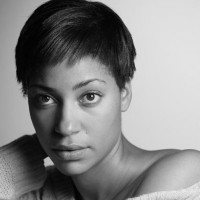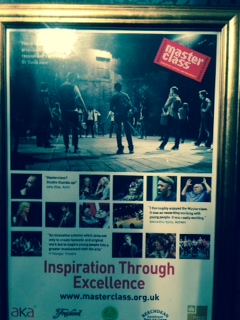 (Photo by Sasha Gusov courtesy of the masterclass.org.uk website)
(Photo by Sasha Gusov courtesy of the masterclass.org.uk website)
Cush Jumbo, a South Londoner through and through led a session at the Theatre Royal Haymarket organised by Masterclass. She opened with “I’m not a master and this is not a class” and the audience breathed a sigh of relief as most were drama students or aspiring writers – young people 30 and under – not necessarily looking for a lesson in all the right things to do but reassurance that what worked for Cush was possible for them too. Hope. I’m always interested in the beginnings of working actresses and writers- and I say ‘working’ for a reason as Cush described one of her course mates from Central who landed a big Hollywood movie straight out of drama school and who has since not worked again. For every job you get that is the happiest you will ever be and everything that follows that until the next ‘eureka’ moment- “they want me, they really want me”, is a worry about how it’s all going to pan out. Cush recalls feeling frustrated with the industry especially the roles often offered to her, growing increasingly indifferent to the other mixed race versions of herself she swore off roles that had ‘blood’ and ‘fam’ in the script. Ready to give up on acting altogether Cush signed up to a PGCE and if it wasn’t for her mother, a psychiatric nurse not in the business, encouraging her instead to pursue her writing, we wouldn’t have been introduced to ‘Josephine and I’, a one-woman, all dancing showcase of Cush’s many talents. From a pub in Camden to the Bush Theatre, the right combination of talent, support from friends and family and the buzz helped by Twitter and Social Media catapulted Cush to success. It might be fair enough to say she has never looked back, until today that is, to encourage those of us beginning our own journey or at a crossroads.

Cush discovered she was a ‘physical learner’ responding better to different practical methods such as sitting on the edge of the stage, dancing while reciting lines or feeling a pinch on a particular word anything that kept it fresh and spontaneous. Others she recognises might be more ‘brain’ or ‘sight’ learners, not to say a physical learner isn’t intelligent but talking through a scene might not speak to them. None of these are more correct as she emphasises that what makes a good actor is being able to figure out what works for you. In turn a director should learn how to bring the best out of their cast and can respond to talent individually Cush says with not too broad a stroke.
A physical learner doesn’t have to be a method actor and Cush highlights the dangers of going so deep into the own recesses of your mind to the detriment of your psychological welfare. Keen to stress that she wished before she left drama school someone had given a talk on how best to protect yourself. You can discover your emotional life and remember things to help you understand the character or situation but you’ve got to be able to come back from that and not become too inner she warns. Keeping your family and friends around you as well as giving your mind a break from time to time were take-away points from Cush. This links into her other piece of advice concerning the mind, comparing it to a muscle you need to exercise like an athlete would. Stopping it from getting rusty in between jobs should be a full-time occupation, whether it entails going to talks or watching current theatre.
Filling our theatres with a young and diverse audience concerns Cush as she puts it to us that these magnificent buildings are public spaces and that young people have as much right to be a part of it as anyone. Hailing from Britain’s only free Performing Arts School Cush was visually frustrated by the recent cuts to the Arts in particular the Dance and Drama Awards (DaDA) funding support for students. When she was growing up it was unlikely that she would see a person of colour playing a classical role and that the Brits school bridged the gap between someone like her, ‘somebody who liked to pretend to be other people’ and somewhere like this, the ostentatious Theatre Royal complete with gold curtains and a ‘Queen chair’. Fortunately for this generation audiences were able to appreciate the all-female cast of Phyllida Lloyd’s Julius Caesar at the Donmar Warehouse, with Cush playing Mark Anthony and Jenny Jules playing Cassius. Maybe the fact that it was set in a prison had something to do with the seemingly colour blind casting but with directors like Phyllida thinking outside of the box it opens up Shakespeare to so many more people. Who says you can’t put on a one-woman show, written and performed by you, who says you can’t play a man, and who says you can’t play Shakespeare? Being a rule breaker like Cush Jumbo might just be what I would like to master.
